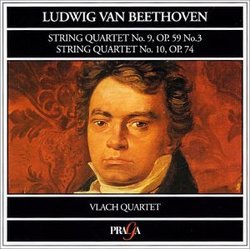| All Artists: Ludwig van Beethoven, Vlach Quartet Title: String Quartets 9 & 10 Op 59,3 & Op 74 Members Wishing: 0 Total Copies: 0 Label: Praga Czech Rep. Release Date: 12/14/1999 Album Type: Import Genre: Classical Styles: Chamber Music, Historical Periods, Classical (c.1770-1830) Number of Discs: 1 SwapaCD Credits: 1 UPC: 794881475322 |
Search - Ludwig van Beethoven, Vlach Quartet :: String Quartets 9 & 10 Op 59,3 & Op 74
 | Ludwig van Beethoven, Vlach Quartet String Quartets 9 & 10 Op 59,3 & Op 74 Genre: Classical |
Larger Image |
CD Details |
CD ReviewsAmbrosia Musæ... Sébastien Melmoth | Hôtel d'Alsace, PARIS | 06/11/2010 (5 out of 5 stars) ".
Ambrosia Musæ... . This issue is an aficionado's dream with a nice programme, exceptional performances by an interesting ensemble, fine recordings in rich acoustics, and eye-catching cover-art. The cover portrait is of an oil painting by a later-Nineteenth Century anonymous French or Italian artist based upon the 1814 engraving of Beethoven by Blasius Höfel, which was always thought to be a very good likeness--(`belle laide' is the term used to describe an attractive person not conventionally handsome). The performances are remastered (1992) single-take `live'-broadcast recordings made for Czechoslovakian Radio in Prague on 31 May 1960 and 10 April 1965. The performance was staged in a concert hall providing a natural acoustic ambience. The ensemble was miked at mid-range, giving us an entrancing Janus-like recording where in the foreground we hear the instrumentalists etched in high-relief, while in the background we get echoes of the hall's natural reverb: a fascinating recording. The Czech ensemble is the original Vlach Quartet (1949-75) which, in keeping with the great Bohemian string tradition, turns in realizations of incredible clarity and equity. Balance is the salient feature here. In what is arguably his greatest critical essay (in the form of a Platonic dialogue)--with its wonderfully corrupt title, `The Decay of Lying'--Oscar Wilde asserts that all art is a type of exaggeration. True enough; but there are degrees within the mediums of arts, and music (as the most abstract of arts) is especially sensitive to exaggeration. There are already inherent degrees of separation between the composer's intentions and the orthographic text of his manuscripts; then further degrees are attained between the composer's MS and the editor's published score; finally there is the further separation of the performer's interpretation and acoustical realization unto the auditor's ear and mind. Withal, exaggerations in music are an especially discrete matter of taste and vision--with further variances between the compositions of one artist to another. Beethoven has an inherent dynamism--an essential energy, an élan vital; and while he also has a prominent delicate emotive side, his innate ebullience is a chief characteristic: in this he needs little exterior exaggeration. And so the original Vlachs here render us incredibly balanced, well-tempered, and equitable performances quite unique in Beethoven's recorded oeuvre. Finally, the programme featured on this disc is very agreeable: the great C-major `Razumovsky' (Op. 59, No. 3) and the lesser-heard `Harp' Quartet (Op. 74). The third `Razumovsky' (1808) features an harmonically ambiguous mysterioso introduction leading into the energetic C-major Allegro; followed by the great a-minor slow movement with its plucked cello (this movement, incidentally, was substituted for the famous a-minor Allegretto of the Seventh Symphony, which Beethoven had originally intended for use in this Quartet [!]); followed by a gracious minuet leading unto the incredible tour de force perpetuum mobile finale: all this is quintessential Beethoven. In the first movement of the `Harp' Quartet (1809) Beethoven employs the sonority of pizzicato as an essential tone colouration. This subtle work continues with one of Beethoven's late expressive hymn-like Adagios (Ab-major) and a sharp Scherzo (c-minor), concluding with a set of Variations. Seemingly effortlessly, the Vlachs perform these works at such an high level of artifice that the audible result seems completely natural. The dynamics, voicing, shading and accents are so well nuanced that they sound absolutely inevitable: one gets the distinct impression that this is how Beethoven should sound. . Vlach String Quartet (1965) Op. 59, No. 3 i. 08'34 ii. 10'00 iii. 05'02 iv. 06'01 Prazák Quartet (2000) Op. 59, No. 3 i. 10'10 ii. 09'24 iii. 04'58 iv. 05'57 Melos Quartett (1985) Op. 59, No. 3 i. 10'07 ii. 08'29 iii. 04'47 iv. 05'41 Amadeus Quartet (1959) Op. 59, No. 3 i. 08'13 ii. 09'23 iii. 04'42 iv. 06'03 ------------ Vlach String Quartet (1960) Op. 74 i. 10'54 ii. 09'33 iii. 05'51 iv. 06'34 Melos Quartett (1985) Op. 74 i. 09'51 ii. 08'59 iii. 04'54 iv. 06'17 Amadeus Quartet (1960) Op. 74 i. 08'35 ii. 10'06 iii. 05'24 iv. 06'57 . Beethoven: The Three String Quartets, Op. 59 "Dedicated to Count Razumovsky" Ludwig van Beethoven: The Middle Quartets - Melos Quartett Beethoven: The String Quartets ." |
